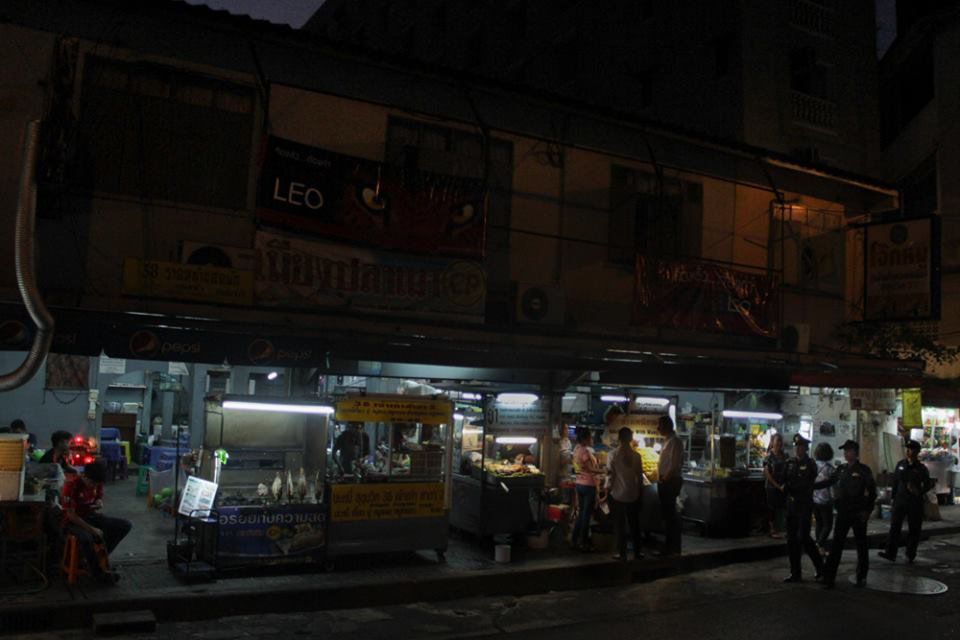Later this month there will be one less place for those addicted to street food: the popular food stalls on Sukhumvit Soi 38.
The owner of the land where these stalls operate died two years ago, and his family has now sold it for the construction of a new luxury condominium. Which means that the building that houses this popular food hub will soon be demolished.
Soi 38 was one of the most popular places in the city to taste authentic Thai food, both for residents and foreign visitors. Its convenient location was just a few meters from BTS Thong Lor, and there was a constant stream of people up and down the soi. The food hub opened every day from 6pm until midnight, offering several kinds of dishes of meat, fish, rice, salads and juices.
Vendors have been operating in the area for four decades, which explains their huge shock at receiving the demolition news. The sellers asked for permission to remain in the location earlier this year in order to earn enough money to relocate their stalls elsewhere.
Some vendors told Coconuts they are not sure what they will do after the building is demolished. Others hope to reach an agreement with the authorities to use other land nearby.
 Police visiting the street food stalls on Sukhumvit Soi 38. Photo: Ana Salvá
Police visiting the street food stalls on Sukhumvit Soi 38. Photo: Ana Salvá
“We are all looking for hope. We’ve been here for a long time,” says Joe, 45, who sells chicken in one of the street stalls. He has not yet found an alternative.
Most vendors came to this place when the road did not exist and was just a bed of sand, while others, like Joe, have taken over a job started by parents or other close family members. Since then, the food vendors have become something of a family, sharing hard work, long conversations and memories over several years.
“My father started this business 40 years ago. Then there were not as many stalls as you see now. It has changed so much from the beginning!” muses Ei, 51, as she stirs a pot of soup in her porridge shop.
Ei plans to move her store to Rama 4 road later this month. At the entrance of her shop hangs a piece of paper with instructions on how to reach her new business, so her regular customers can continue buying from her.
Meanwhile, the Gateway Ekamai shopping mall has invited a dozen vendors to relocate to outside the mall on Sukhumvit Soi 42. Others will move into a space at the beginning of Soi 38 in the parking lot of Sutti Mansion, which has become an increasingly strong contender for relocation after the demolition announcement.
“I can’t move to Sutti Mansion because there is a stall selling fruit juice in the entrance already,” says Marley, 56.
“I’ve spent 32 years preparing juices, here in the same square meter where I am now. I feel very sad. I do not know what I will do.”

Marley working at her stall on Sukhumvit Soi 38. Photo: Ana Salvá
Maybe we will try to move in front of the street, but I am not sure if the police will allow us to do so. Do you see them at the beginning of the street? They come all the time,” she adds, referring to police officers who frequent the area.
“I’m going back home to Isaan province,” says Pan, 40, who prepares salads in a small restaurant. She says she will try to raise the money needed to open a new establishment in her hometown.
The street food of Soi 38 is not the only tourist favorite that will soon disappear from Bangkok. The famous amulet market that was touted as a must-see by several city travel guides also ceased to exist in early December after a campaign by the City Council to “reclaim public space” and “reorganize the capital.”
The market had more than 100 stalls and was a well-known attraction in the city. According to believers, it was the ideal place to buy charms and talismans that could attract good luck or cure personal problems.
The problem was that its location was near the Grand Palace, one of the busiest areas of Bangkok, which caused many complaints about traffic in the area. The City Council advised the sellers to relocate, suggesting places such as Rama II road or the Bang Bua Thong market, more than an hour’s drive outside Bangkok. Authorities said the measure would help to “improve circulation” as the sidewalks will now be usable by pedestrians who will not be forced to walk on the road.
The next goal for City Hall is closing Pak Khlong Talad, another place of cultural importance thanks to the stalls of fresh flowers that have been operating for over 40 years: it is located just 10 minutes from the Grand Palace area. Meanwhile around 500 street stalls will also disappear from the Khao San Road area; half of them will simply close as they are illegal, while the legal stalls will close when their contracts expire.
Last year the city also saw the relocation of the iconic Lumpini Boxing Stadium, which opened in 1956 before the invasion of skyscrapers. It was located in the business district, but forced to move to Ram Intra road near Don Mueang airport after its contract was not renewed, to make way for real estate development.
Related:





Reader Interactions